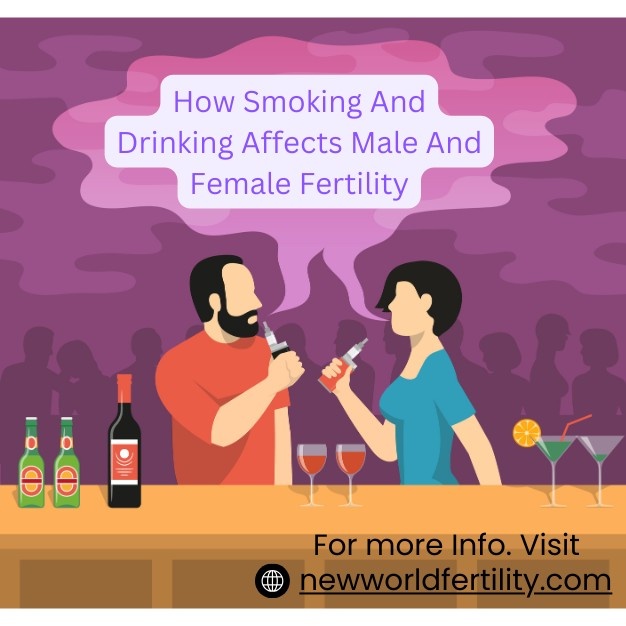Introduction
Fertility is a crucial aspect of reproductive health, and lifestyle choices play a significant role in determining reproductive success. Among the most harmful habits impacting fertility are smoking and alcohol consumption. Research has consistently shown that these substances can negatively affect both male and female fertility, reducing the chances of conception and increasing the risk of complications. In this article, we will explore how smoking and alcohol affect fertility in men and women and provide insights into how to mitigate these risks.
The Impact of Smoking on Male and Female Fertility
Effects of Smoking on Female Fertility
Reduced Ovarian Reserve: Smoking accelerates ovarian aging, leading to a diminished ovarian reserve and early menopause.
Hormonal Imbalance: Nicotine and other chemicals disrupt hormonal balance, affecting ovulation and menstrual cycles.
Increased Risk of Miscarriage: Smoking is associated with a higher risk of pregnancy loss due to reduced blood flow to the uterus.
Ectopic Pregnancy: The toxic chemicals in cigarettes can damage fallopian tubes, increasing the chances of ectopic pregnancy.
Effects of Smoking on Male Fertility
Reduced Sperm Count & Motility: Studies indicate that smoking lowers sperm count and impairs motility, making conception difficult.
DNA Damage in Sperm: Smoking increases oxidative stress, leading to DNA fragmentation, which can contribute to infertility and birth defects.
Lower Testosterone Levels: Tobacco use has been linked to decreased testosterone production, affecting libido and sperm quality.
Erectile Dysfunction: Smoking restricts blood flow, leading to erectile dysfunction, which further hampers reproductive potential.
The Impact of Alcohol on Male and Female Fertility
Effects of Alcohol on Female Fertility
Disrupted Ovulation: Excessive alcohol consumption interferes with ovulation, leading to irregular menstrual cycles and anovulation.
Increased Risk of Miscarriage & Stillbirth: Studies show that alcohol consumption during pregnancy raises the risk of miscarriage and fetal complications.
Hormonal Disruptions: Alcohol affects estrogen and progesterone levels, both crucial for successful conception and pregnancy.
Reduced IVF Success Rates: Women undergoing fertility treatments like IVF have lower success rates when consuming alcohol regularly.
Effects of Alcohol on Male Fertility
Lower Sperm Quality: Alcohol reduces sperm count, motility, and morphology, making conception more challenging.
Testosterone Reduction: Chronic alcohol use lowers testosterone levels, affecting libido and sperm production.
Erectile Dysfunction: Heavy drinking is a known cause of erectile dysfunction, further reducing fertility potential.
DNA Damage in Sperm: Like smoking, alcohol consumption leads to oxidative stress, increasing the risk of DNA damage in sperm.
How to Improve Fertility by Quitting Smoking and Alcohol
Seek Medical Assistance: Consulting a fertility specialist can provide personalized strategies to quit smoking and limit alcohol intake.
Adopt a Healthy Lifestyle: A balanced diet, regular exercise, and stress management can counteract the negative effects of smoking and alcohol.
Consider Detoxification: Professional detox programs can help eliminate harmful toxins from the body.
Support Groups & Counseling: Behavioral therapy and support groups can provide motivation and guidance for quitting these habits.
FAQs About Smoking, Alcohol, and Fertility
1. How long after quitting smoking does fertility improve?
Fertility improvements can be observed within 3 to 12 months after quitting, with increased egg and sperm quality over time.
2. Can occasional alcohol consumption affect fertility?
Moderate drinking may not significantly impact fertility, but excessive alcohol use can lead to hormonal imbalances and reproductive issues.
3. Does secondhand smoke affect fertility?
Yes, exposure to secondhand smoke can reduce fertility in both men and women by damaging reproductive cells and disrupting hormone levels.
4. Can quitting smoking and drinking improve IVF success rates?
Yes, studies indicate that quitting smoking and reducing alcohol intake significantly enhance the success rates of fertility treatments like IVF.
Conclusion
Smoking and alcohol consumption have profound negative effects on fertility in both men and women. These lifestyle habits can lead to hormonal imbalances, DNA damage, reduced sperm and egg quality, and increased pregnancy risks. If you are planning to conceive or undergoing fertility treatments, it is highly recommended to quit smoking and limit alcohol intake to improve reproductive health.
For expert guidance on fertility treatments and lifestyle modifications, visit New World Fertility. Our specialists can help you achieve a healthy pregnancy with personalized fertility solutions.

 Feb-04-2025
Feb-04-2025